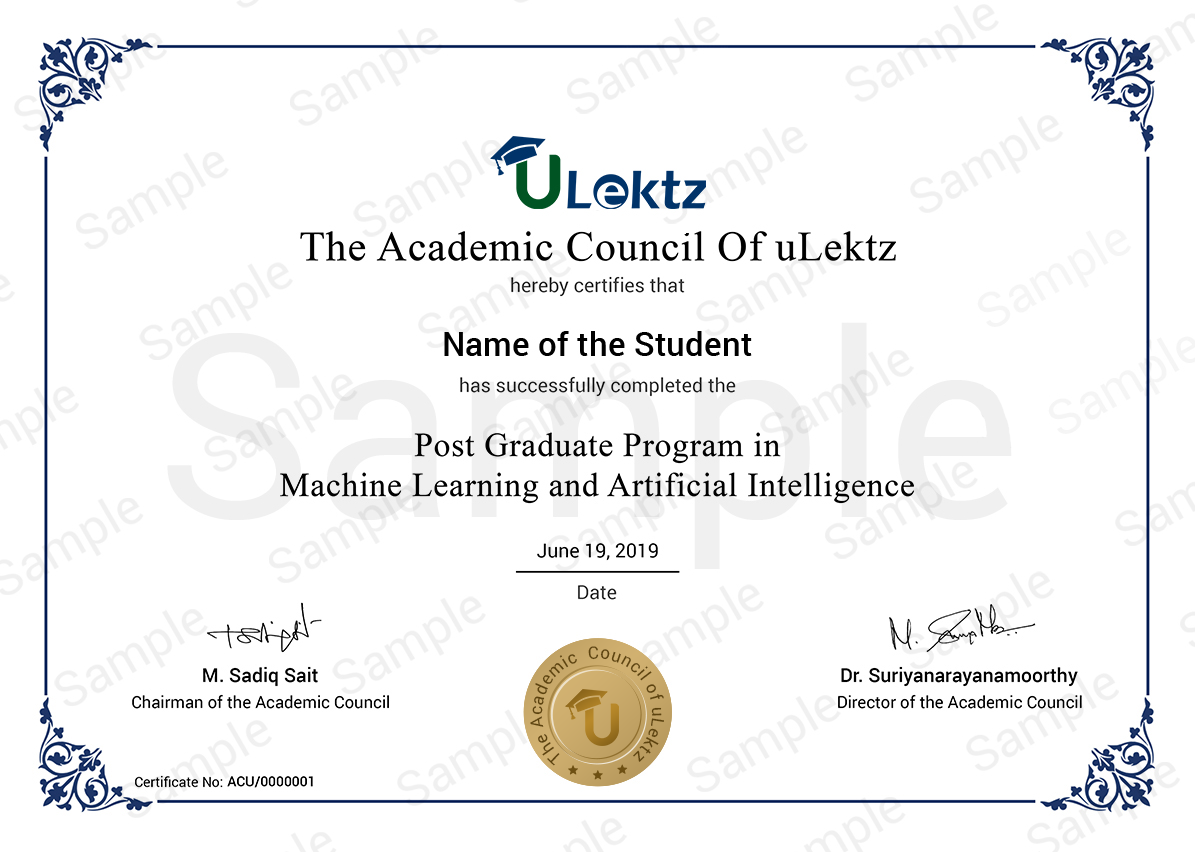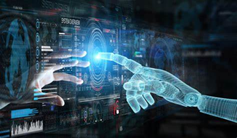

Note: Please check your Spam or Junk folder, in case you didn't receive the email with verification code.
Non-Linear: Random Order
Understanding Core Concepts: Grasp the fundamentals of data science and machine learning techniques.
Proficient Use of Tools: Gain hands-on experience with data science and machine learning tools such as Python, R, TensorFlow, and scikit-learn.
Application Development: Learn to develop and implement data-driven applications and machine learning models.
Integration with Other Technologies: Understand how data science and machine learning integrate with big data, cloud computing, and AI.
Data Manipulation: Develop skills to clean, preprocess, and manipulate data.
Statistical Analysis: Learn to apply statistical methods to analyze data and draw meaningful conclusions.
Machine Learning Algorithms: Gain proficiency in implementing and tuning various machine learning algorithms.
Data Visualization: Learn to create insightful visualizations to communicate data findings effectively.
Model Evaluation: Understand how to evaluate and improve machine learning models using various metrics and techniques.
Technical Proficiency: Mastery of programming languages like Python and R, and tools like TensorFlow, Keras, and scikit-learn.
Analytical Skills: Develop the ability to analyze and interpret complex data sets.
Problem-Solving: Enhance problem-solving skills by tackling real-world data challenges.
Communication: Learn to communicate data insights effectively to stakeholders through visualizations and reports.
Research Skills: Develop the ability to stay updated with the latest trends and advancements in data science and machine learning.
Data Scientist: Analyze large datasets to extract insights and build predictive models.
Machine Learning Engineer: Develop and deploy machine learning models and algorithms.
Data Analyst: Interpret data and provide actionable insights to guide business decisions.
Business Intelligence Analyst: Create reports and dashboards to help organizations make data-driven decisions.
AI Research Scientist: Conduct research and develop new algorithms and models in the field of artificial intelligence.
Big Data Engineer: Design and manage large-scale data processing systems.
Data Engineer: Build and maintain data pipelines to ensure data is accessible and usable for analysis.
 What is Data Science
What is Data Science
 Overview of Machine Learning and AI
Overview of Machine Learning and AI
 The Data Science Workflow
The Data Science Workflow
 Applications of Data Science and Machine Learning
Applications of Data Science and Machine Learning
 Ethical Considerations in AI and Data Usage
Ethical Considerations in AI and Data Usage
 Unit 1-Self Assessment
20 Questions
Unit 1-Self Assessment
20 Questions
 Types of Data Structured, Semi-Structured, and Unstructured
Types of Data Structured, Semi-Structured, and Unstructured
 Data Collection Techniques
Data Collection Techniques
 Handling Missing and Outlier Data
Handling Missing and Outlier Data
 Data Transformation and Feature Scaling
Data Transformation and Feature Scaling
 Exploratory Data Analysis
Exploratory Data Analysis
 Unit 2-Self Assessment
20 Questions
Unit 2-Self Assessment
20 Questions
 Introduction to Python and R for Data Science
Introduction to Python and R for Data Science
 Libraries for Data Analysis
Libraries for Data Analysis
 Data Visualization Tools
Data Visualization Tools
 Working with Databases and SQL
Working with Databases and SQL
 Jupyter Notebooks for Interactive Development
Jupyter Notebooks for Interactive Development
 Unit 3-Self Assessment
20 Questions
Unit 3-Self Assessment
20 Questions
 Descriptive and Inferential Statistics
Descriptive and Inferential Statistics
 Probability Distributions and Hypothesis Testing
Probability Distributions and Hypothesis Testing
 Correlation and Regression Analysis
Correlation and Regression Analysis
 Dimensionality Reduction Techniques (PCA, t-SNE)
Dimensionality Reduction Techniques (PCA, t-SNE)
 Sampling and Data Partitioning
Sampling and Data Partitioning
 Unit 4-Self Assessment
20 Questions
Unit 4-Self Assessment
20 Questions
 Supervised vs. Unsupervised Learning
Supervised vs. Unsupervised Learning
 Common Algorithms (Linear Regression, k-Nearest Neighbors, SVM)
Common Algorithms (Linear Regression, k-Nearest Neighbors, SVM)
 Evaluation Metrics (Accuracy, Precision, Recall, F1-Score)
Evaluation Metrics (Accuracy, Precision, Recall, F1-Score)
 Cross-Validation and Hyperparameter Tuning
Cross-Validation and Hyperparameter Tuning
 Avoiding Overfitting and Underfitting
Avoiding Overfitting and Underfitting
 Unit 5-Self Assessment
20 Questions
Unit 5-Self Assessment
20 Questions
 Decision Trees and Random Forests
Decision Trees and Random Forests
 Gradient Boosting Techniques
Gradient Boosting Techniques
 Clustering Algorithms (K-Means, DBSCAN)
Clustering Algorithms (K-Means, DBSCAN)
 Recommender Systems
Recommender Systems
 Ensemble Learning Methods
Ensemble Learning Methods
 Unit 6-Self Assessment
20 Questions
Unit 6-Self Assessment
20 Questions
 Basics of Text Preprocessing (Tokenization, Stemming, Lemmatization)
Basics of Text Preprocessing (Tokenization, Stemming, Lemmatization)
 Bag of Words and TF-IDF
Bag of Words and TF-IDF
 Sentiment Analysis and Text Classification
Sentiment Analysis and Text Classification
 Word Embeddings (Word2Vec, GloVe)
Word Embeddings (Word2Vec, GloVe)
 Introduction to Transformers and BERT
Introduction to Transformers and BERT
 Unit 7-Self Assessment
20 Questions
Unit 7-Self Assessment
20 Questions
 Introduction to Neural Networks
Introduction to Neural Networks
 Activation Functions and Loss Functions
Activation Functions and Loss Functions
 Convolutional Neural Networks (CNNs) for Image Processing
Convolutional Neural Networks (CNNs) for Image Processing
 Recurrent Neural Networks (RNNs) and LSTMs for Sequential Data
Recurrent Neural Networks (RNNs) and LSTMs for Sequential Data
 Transfer Learning and Pretrained Models
Transfer Learning and Pretrained Models
 Unit 8-Self Assessment
20 Questions
Unit 8-Self Assessment
20 Questions
 Principles of Effective Data Visualization
Principles of Effective Data Visualization
 Tools for Interactive Dashboards
Tools for Interactive Dashboards
 Visualizing Machine Learning Models
Visualizing Machine Learning Models
 Storytelling with Data
Storytelling with Data
 Case Studies in Data Communication
Case Studies in Data Communication
 Unit 9-Self Assessment
20 Questions
Unit 9-Self Assessment
20 Questions
 Introduction to Big Data Frameworks
Introduction to Big Data Frameworks
 Distributed Computing for Large Datasets
Distributed Computing for Large Datasets
 Working with Cloud Platforms
Working with Cloud Platforms
 Scalable Machine Learning with Spark MLlib
Scalable Machine Learning with Spark MLlib
 Case Studies of Big Data Applications
Case Studies of Big Data Applications
 Unit 10-Self Assessment
20 Questions
Unit 10-Self Assessment
20 Questions
 Machine Learning in Finance
Machine Learning in Finance
 Healthcare Applications
Healthcare Applications
 Retail and Marketing Analytics
Retail and Marketing Analytics
 Natural Sciences
Natural Sciences
 Emerging Domains in AI
Emerging Domains in AI
 Unit 11-Self Assessment
20 Questions
Unit 11-Self Assessment
20 Questions
 Real-World Data Science Problem Solving
Real-World Data Science Problem Solving
 Developing and Deploying a Machine Learning Model
Developing and Deploying a Machine Learning Model
 Analysis of Industry-Specific Case Studies
Analysis of Industry-Specific Case Studies
 Peer Review and Feedback on Capstone Projects
Peer Review and Feedback on Capstone Projects
 Reflective Learning from Capstone Challenges
Reflective Learning from Capstone Challenges
 Unit 12-Self Assessment
20 Questions
Unit 12-Self Assessment
20 Questions
The certificate issued for the Course will have
Only the e-certificate will be made available. No Hard copies. The certificates issued by Odisha State Open University. can be e-verifiable at www.ulektzskills.com/verify.



 40 hours Learning Content
40 hours Learning Content 100% online Courses
100% online Courses English Language
English Language Certifications
Certifications